| Listing 1 - 10 of 58 | << page >> |
Sort by
|
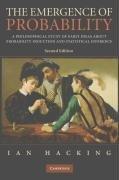
ISBN: 9780521685573 9780521866552 0521866553 0521685575 9780511817557 1107264111 051181755X Year: 2006 Publisher: Cambridge Cambridge University Press
Abstract | Keywords | Export | Availability | Bookmark
 Loading...
Loading...Choose an application
- Reference Manager
- EndNote
- RefWorks (Direct export to RefWorks)
Historical records show that there was no real concept of probability in Europe before the mid-seventeenth century, although the use of dice and other randomizing objects was commonplace. Ian Hacking presents a philosophical critique of early ideas about probability, induction, and statistical inference and the growth of this new family of ideas in the fifteenth, sixteenth, and seventeenth centuries. Hacking invokes a wide intellectual framework involving the growth of science, economics, and the theology of the period. He argues that the transformations that made it possible for probability concepts to emerge have constrained all subsequent development of probability theory and determine the space within which philosophical debate on the subject is still conducted. First published in 1975, this edition includes an introduction that contextualizes his book in light of developing philosophical trends. Ian Hacking is the winner of the Holberg International Memorial Prize 2009.
Philosophy of science --- Probabilities --- Induction (Mathematics) --- Mathematical statistics --- History. --- Arts and Humanities --- Philosophy --- Induction (Logic) --- Mathematics --- Mathematical induction --- Probabilités --- Induction (mathématiques) --- Statistique mathématique --- Histoire --- History
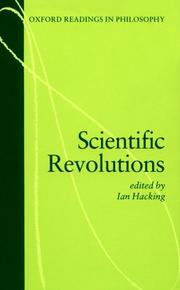
ISBN: 019875051X 9780198750512 Year: 1981 Publisher: New York (N.Y.): Oxford university press,
Abstract | Keywords | Export | Availability | Bookmark
 Loading...
Loading...Choose an application
- Reference Manager
- EndNote
- RefWorks (Direct export to RefWorks)
Pure sciences. Natural sciences (general) --- Philosophy of science --- Science --- Philosophy --- Sciences --- Philosophie --- -Natural science --- Science of science --- Philosophy. --- -Philosophy --- Science. --- Normal science --- Histoire --- Science - Philosophy
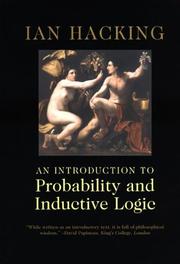
ISBN: 0521775019 0521772877 9780521775014 9780521772877 Year: 2001 Publisher: Cambridge: Cambridge university press,
Abstract | Keywords | Export | Availability | Bookmark
 Loading...
Loading...Choose an application
- Reference Manager
- EndNote
- RefWorks (Direct export to RefWorks)
Logic --- Probabilities --- Induction (Logic) --- Probabilités --- Induction (Logique) --- Inductive logic --- Logic, Inductive --- Reasoning --- Probability --- Statistical inference --- Combinations --- Mathematics --- Chance --- Least squares --- Mathematical statistics --- Risk --- Probabilities. --- Induction (Logic). --- Induction (logique) --- Probabilités --- Probabilités.
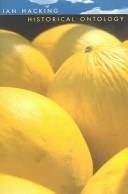
ISBN: 0674016076 067400616X 9780674016071 9780674006164 Year: 2002 Publisher: Cambridge (Mass.): Harvard university press,
Abstract | Keywords | Export | Availability | Bookmark
 Loading...
Loading...Choose an application
- Reference Manager
- EndNote
- RefWorks (Direct export to RefWorks)
With the unusual clarity, distinctive and engaging style, and penetrating insight that have drawn such a wide range of readers to his work, Ian Hacking here offers his reflections on the philosophical uses of history. The focus of this volume, which collects both recent and now-classic essays, is the historical emergence of concepts and objects, through new uses of words and sentences in specific settings, and new patterns or styles of reasoning within those sentences. In its lucid and thoroughgoing look at the historical dimension of concepts, the book is at once a systematic formulation of Hacking’s approach and its relation to other types of intellectual history, and a valuable contribution to philosophical understanding. Hacking opens the volume with an extended meditation on the philosophical significance of history. The importance of Michel Foucault—for the development of this theme, and for Hacking’s own work in intellectual history—emerges in the following chapters, which place Hacking’s classic essays on Foucault within the wider context of general reflections on historical methodology. Against this background, Hacking then develops ideas about how language, styles of reasoning, and “psychological” phenomena figure in the articulation of concepts--and in the very prospect of doing philosophy as historical ontology.
History as a science --- Philosophy --- History --- Methodology --- Historicism --- Historicism. --- Methodology. --- Representation (Philosophy) --- Représentation (Philosophie) --- Historicisme --- Mental philosophy --- Humanities --- Research --- Humanities Methodology --- History - Philosophy
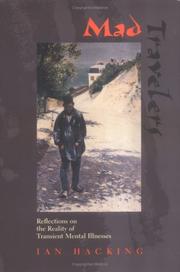
ISBN: 0813918235 Year: 1998 Publisher: Charlottesville University press of Virginia
Abstract | Keywords | Export | Availability | Bookmark
 Loading...
Loading...Choose an application
- Reference Manager
- EndNote
- RefWorks (Direct export to RefWorks)
Fugue (Psychology) --- Niche (Ecology). --- Social psychiatry. --- Klinische psychologie --- Case studies. --- Specifieke problemen. --- Niche (Ecology) --- Social psychiatry --- Psychiatry, Social --- Clinical sociology --- Mental health --- Psychiatry --- Social medicine --- Social psychology --- Microhabitat --- Biotic communities --- Competition (Biology) --- Ecology --- Habitat (Ecology) --- Dissociative disorders --- Memory disorders --- Case studies --- Tissié, Philippe,
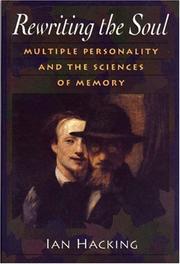
ISBN: 1400811937 1282752235 9786612752230 1400821681 069105908X 069103642X 9781400821686 9780691059082 9780691036427 1400803268 Year: 1995 Publisher: Princeton, N.J. Princeton University Press
Abstract | Keywords | Export | Availability | Bookmark
 Loading...
Loading...Choose an application
- Reference Manager
- EndNote
- RefWorks (Direct export to RefWorks)
Twenty-five years ago one could list by name the tiny number of multiple personalities recorded in the history of Western medicine, but today hundreds of people receive treatment for dissociative disorders in every sizable town in North America. Clinicians, backed by a grassroots movement of patients and therapists, find child sexual abuse to be the primary cause of the illness, while critics accuse the “MPD” community of fostering false memories of childhood trauma. Here the distinguished philosopher Ian Hacking uses the MPD epidemic and its links with the contemporary concept of child abuse to scrutinize today’s moral and political climate, especially our power struggles about memory and our efforts to cope with psychological injuries.What is it like to suffer from multiple personality? Most diagnosed patients are women: why does gender matter? How does defining an illness affect the behavior of those who suffer from it? And, more generally, how do systems of knowledge about kinds of people interact with the people who are known about? Answering these and similar questions, Hacking explores the development of the modern multiple personality movement. He then turns to a fascinating series of historical vignettes about an earlier wave of multiples, people who were diagnosed as new ways of thinking about memory emerged, particularly in France, toward the end of the nineteenth century. Fervently occupied with the study of hypnotism, hysteria, sleepwalking, and fugue, scientists of this period aimed to take the soul away from the religious sphere. What better way to do this than to make memory a surrogate for the soul and then subject it to empirical investigation? Made possible by these nineteenth-century developments, the current outbreak of dissociative disorders is embedded in new political settings. Rewriting the Soul concludes with a powerful analysis linking historical and contemporary material in a fresh contribution to the archaeology of knowledge. As Foucault once identified a politics that centers on the body and another that classifies and organizes the human population, Hacking has now provided a masterful description of the politics of memory : the scientizing of the soul and the wounds it can receive.
Memory -- Social aspects. --- Multiple personality -- History. --- Multiple personality -- Philosophy. --- Multiple personality -- Social aspects. --- Soul -- Psychological aspects. --- Multiple personality --- Memory --- Soul --- Learning --- Dissociative Disorders --- Humanities --- Mental Processes --- Mental Disorders --- Psychiatry and Psychology --- Psychological Phenomena and Processes --- Philosophy --- Multiple Personality Disorder --- Psychiatry --- Health & Biological Sciences --- Psychiatric Disorders, Individual --- Social aspects --- History --- Psychological aspects --- Philosophy. --- Social aspects. --- History. --- Psychological aspects. --- Pneuma --- Alternating personality --- Consciousness, Multiple --- DID (Personality disorder) --- Dissociated personality --- Dissociative identity disorder --- Double consciousness --- Double personality --- Dual personality --- MPD (Personality disorder) --- Multiple consciousness --- Multiple identity disorder --- Multiple personalities --- Multiple personality disorder --- Personality, Multiple --- Split personality --- Retention (Psychology) --- -Multiple personality --- Dissociative disorders --- -Future life --- Future life --- Philosophical anthropology --- Theological anthropology --- Animism --- Spirit --- Intellect --- Psychology --- Thought and thinking --- Comprehension --- Executive functions (Neuropsychology) --- Mnemonics --- Perseveration (Psychology) --- Reproduction (Psychology) --- Cognitive psychology --- Multiple Persönlichkeit --- Gedächtnis --- Seele --- Philosophie --- Humans --- Memory (Mental processes) --- Human beings
Book
ISBN: 0521051657 9780521051651 Year: 1974 Publisher: London: Cambridge university press,
Abstract | Keywords | Export | Availability | Bookmark
 Loading...
Loading...Choose an application
- Reference Manager
- EndNote
- RefWorks (Direct export to RefWorks)
Mathematical logic --- Mathematical statistics --- Mathematical statistics. --- Statistique mathématique --- Statistique mathématique
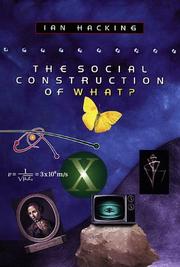
ISBN: 067481200X 0674004124 9780674004122 9780674812000 Year: 1999 Publisher: Cambridge (Mass.): Harvard university press,
Abstract | Keywords | Export | Availability | Bookmark
 Loading...
Loading...Choose an application
- Reference Manager
- EndNote
- RefWorks (Direct export to RefWorks)
Lost in the raging debate over the validity of social construction is the question of what, precisely, is being constructed. Facts, gender, quarks, reality? Is it a person? An object? An idea? A theory? Each entails a different notion of social construction, Ian Hacking reminds us. His book explores an array of examples to reveal the deep issues underlying contentious accounts of reality. Especially troublesome in this dispute is the status of the natural sciences, and this is where Hacking finds some of his most telling cases, from the conflict between biological and social approaches to mental illness to vying accounts of current research in sedimentary geology. He looks at the issue of child abuse - very much a reality, though the idea of child abuse is a social product. He also cautiously examines the ways in which advanced research on new weapons influences not the content but the form of science. In conclusion, Hacking comments on the "culture wars" in anthropology, in particular a spat between leading ethnographers over Hawaii and Captain Cook. Written with generosity and gentle wit by one of our most distinguished philosophers of science, this wise book brings a much needed measure of clarity to current arguments about the nature of knowledge.
Knowledge, Sociology of --- #VCV monografie 1999 --- Knowledge, Theory of (Sociology) --- Sociology of knowledge --- Knowledge, Sociology of. --- 316.75 --- Communication --- Knowledge, Theory of --- Public opinion --- Sociology --- Social epistemology --- 316.75 Kennissociologie. Ideologie --- Kennissociologie. Ideologie --- Philosophy of science --- Geografie --- Sociale en economische geografie --- Algemeen. --- Sociologie de la connaissance
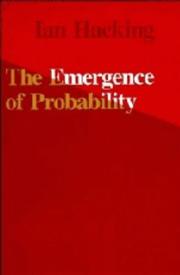
ISBN: 0521204607 0521318033 9780521204606 Year: 1975 Publisher: Cambridge: Cambridge university press,
Abstract | Keywords | Export | Availability | Bookmark
 Loading...
Loading...Choose an application
- Reference Manager
- EndNote
- RefWorks (Direct export to RefWorks)
Philosophy of science --- Induction (Mathematics) --- Mathematical statistics --- Probabilities --- 51 <09> --- Mathematical induction --- Induction (Logic) --- Mathematics --- History --- Mathematics--Geschiedenis van .. --- History. --- Probabilités --- Induction (Mathématiques) --- Statistique mathématique --- Histoire --- Mathematics--Geschiedenis van . --- Mathematics--Geschiedenis van --- Probabilities - History --- Induction (Mathematics) - History --- Mathematical statistics - History
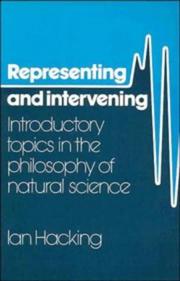
ISBN: 9780521238298 9780511814563 9780521282468 0521238293 0521282462 1107263506 0511814569 Year: 1983 Publisher: Cambridge: Cambridge university press,
Abstract | Keywords | Export | Availability | Bookmark
 Loading...
Loading...Choose an application
- Reference Manager
- EndNote
- RefWorks (Direct export to RefWorks)
This 1983 book is a lively and clearly written introduction to the philosophy of natural science, organized around the central theme of scientific realism. It has two parts. 'Representing' deals with the different philosophical accounts of scientific objectivity and the reality of scientific entities. The views of Kuhn, Feyerabend, Lakatos, Putnam, van Fraassen, and others, are all considered. 'Intervening' presents the first sustained treatment of experimental science for many years and uses it to give a new direction to debates about realism. Hacking illustrates how experimentation often has a life independent of theory. He argues that although the philosophical problems of scientific realism can not be resolved when put in terms of theory alone, a sound philosophy of experiment provides compelling grounds for a realistic attitude. A great many scientific examples are described in both parts of the book, which also includes lucid expositions of recent high energy physics and a remarkable chapter on the microscope in cell biology.
Science --- Philosophy. --- Pure sciences. Natural sciences (general) --- Philosophy of science --- Philosophy --- Sciences --- Philosophie --- Normal science --- Arts and Humanities --- Science - Philosophy
| Listing 1 - 10 of 58 | << page >> |
Sort by
|

 Search
Search Feedback
Feedback About UniCat
About UniCat  Help
Help News
News